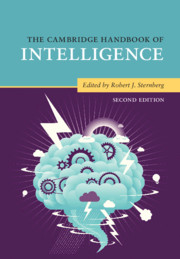Book contents
- The Cambridge Handbook of Intelligence
- The Cambridge Handbook of Intelligence
- Copyright page
- Dedication
- Contents
- Figures
- Tables
- Contributors
- Preface
- Part I Intelligence and Its Measurement
- Part II Development of Intelligence
- Part III Intelligence and Group Differences
- Part IV Biology of Intelligence
- Part V Intelligence and Information Processing
- 20 Basic Processes of Intelligence
- 21 Working Memory and Intelligence
- 22 Intelligence and Reasoning
- 23 Problem-Solving and Intelligence
- 24 Intelligence and Decision-Making
- 25 Artificial Intelligence
- 26 Intelligence and Video Games
- Part VI Kinds of Intelligence
- Part VII Intelligence and Its Role in Society
- Part VIII Intelligence and Allied Constructs
- Part IX Folk Conceptions of Intelligence
- Part X Conclusion
- Author Index
- Subject Index
- References
21 - Working Memory and Intelligence
from Part V - Intelligence and Information Processing
Published online by Cambridge University Press: 13 December 2019
- The Cambridge Handbook of Intelligence
- The Cambridge Handbook of Intelligence
- Copyright page
- Dedication
- Contents
- Figures
- Tables
- Contributors
- Preface
- Part I Intelligence and Its Measurement
- Part II Development of Intelligence
- Part III Intelligence and Group Differences
- Part IV Biology of Intelligence
- Part V Intelligence and Information Processing
- 20 Basic Processes of Intelligence
- 21 Working Memory and Intelligence
- 22 Intelligence and Reasoning
- 23 Problem-Solving and Intelligence
- 24 Intelligence and Decision-Making
- 25 Artificial Intelligence
- 26 Intelligence and Video Games
- Part VI Kinds of Intelligence
- Part VII Intelligence and Its Role in Society
- Part VIII Intelligence and Allied Constructs
- Part IX Folk Conceptions of Intelligence
- Part X Conclusion
- Author Index
- Subject Index
- References
Summary
Working memory is a system that allows for the maintenance of goal-relevant information in the face of concurrent processing and/or distraction. Working memory plays a role in many real-world cognitive tasks such as reading, reasoning, planning, and problem-solving. It consists of multiple components, including domain-general mechanisms associated with attention control and domain-specific processes associated with short-term storage. It is also a limited capacity system and working memory capacity is highly correlated with general fluid intelligence. This chapter provides a review of cognitive models of working memory, the measurement of working memory capacity, and evidence linking working memory capacity and intelligence. Several theoretical frameworks, such as executive attention theory and process overlap theory, are also discussed.
Keywords
- Type
- Chapter
- Information
- The Cambridge Handbook of Intelligence , pp. 504 - 527Publisher: Cambridge University PressPrint publication year: 2020
References
- 1
- Cited by

